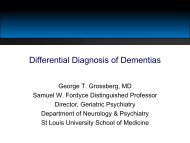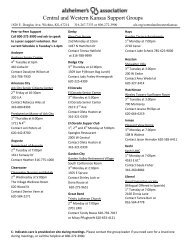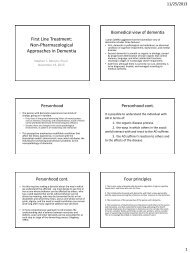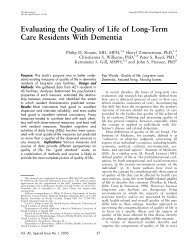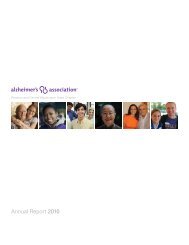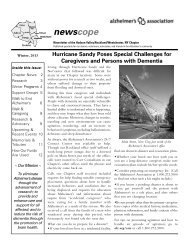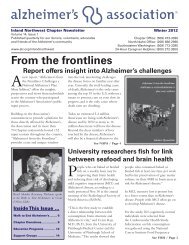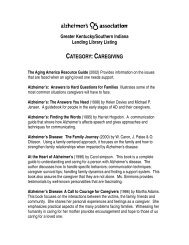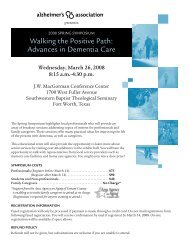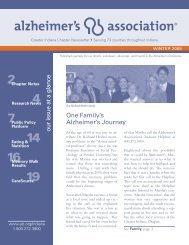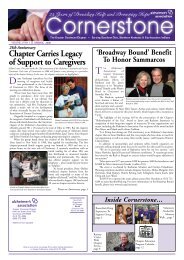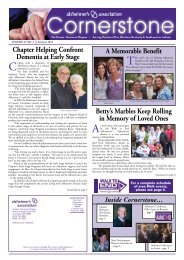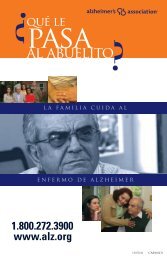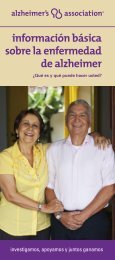parent's guide - Alzheimer's Association
parent's guide - Alzheimer's Association
parent's guide - Alzheimer's Association
You also want an ePaper? Increase the reach of your titles
YUMPU automatically turns print PDFs into web optimized ePapers that Google loves.
parent’s<br />
<strong>guide</strong><br />
Helping children and teens<br />
understand Alzheimer’s disease<br />
the compassion to care, the leadership to conquer
what is alzheimer’s?<br />
Alzheimer’s (AHLZ-high-merz) is a disease of the<br />
brain that causes problems with memory, thinking and<br />
behavior. It is not a normal part of aging.<br />
Alzheimer’s worsens over time. Although symptoms<br />
can vary widely, the first noticeable problem is often<br />
forgetfulness severe enough to affect the ability to<br />
function at home or at work, or to enjoy lifelong hobbies.<br />
Other symptoms include confusion, getting lost in<br />
familiar places, misplacing things and trouble with<br />
speaking or writing.<br />
how children and teens<br />
are affected<br />
Alzheimer’s disease can have a big impact on<br />
every member of the family, including children.<br />
Each child will react differently to someone who<br />
has Alzheimer’s.<br />
The young people in your life might have questions<br />
about what is happening. It’s important for you to<br />
answer these questions openly and honestly. It will also<br />
help to share with them the changes the disease might<br />
bring, now and in the future.<br />
Factors that may affect your child<br />
include:<br />
z How your child is related to the person (a parent,<br />
grandparent, relative, friend).<br />
z How close your child is to this person emotionally.<br />
z Where this person lives (in the same home,<br />
long-term care facility, another state).<br />
1 2
Common reactions of children and teens<br />
When a family member is living with dementia,<br />
a child might feel:<br />
z Sad about how the person is changing.<br />
z Curious about how people get the disease.<br />
z Confused about why the person acts differently<br />
or doesn’t recognize him or her.<br />
z Frustrated by the new things it’s necessary to do<br />
like repeating words or phrases.<br />
z Guilty for resenting the time and resources the<br />
person requires of the family.<br />
z Afraid of the different ways in which the person<br />
may act.<br />
z Jealous of the additional time and attention given<br />
to the person.<br />
z Worried that he or she — or other friends and family<br />
members — might also get Alzheimer’s.<br />
z Embarrassed to have friends or other visitors to<br />
the house if the person is there and acts strangely.<br />
z Unsure how to act around the person.<br />
All of these feelings are normal. Keep in mind that<br />
children are also resilient and may respond to the situation<br />
with few problems.<br />
Encourage your child to keep a journal. Writing down<br />
feelings might help bring the child comfort.<br />
It might be difficult to recognize how your child<br />
is feeling. A child who is having a hard time<br />
understanding or accepting the disease might:<br />
z Withdraw from or lose patience with the person.<br />
z Express physical pain, like a stomachache<br />
or headache.<br />
z Do poorly in school.<br />
z Spend more time away from home.<br />
z Stop inviting friends to the house.<br />
z Argue more with others at home, especially those<br />
providing care for the person with Alzheimer’s.<br />
3 4
Make sure your child knows that even though a<br />
person with dementia may be forgetful, love and<br />
kindness are still felt in the moment.<br />
Special issues for teens<br />
Adolescence is challenging in general, and the disease<br />
may bring even more changes to your teen’s life. For<br />
example, you may need to ask your teen to pitch in<br />
more around the house or to assist with caregiving.<br />
Teens may express a variety of thoughts about how<br />
their lives have changed, such as:<br />
z I don’t like to talk with my friends about what’s<br />
going on at home.<br />
z When I help out with my uncle, I feel like my<br />
family really needs me.<br />
z I feel good that I know how to do the little things<br />
that make a difference for my dad.<br />
z Sometimes I feel embarrassed about how my<br />
grandpa is acting.<br />
z I don’t feel comfortable having my friends over<br />
right now.<br />
z I’ve never felt closer to my mom than I do now<br />
because we’re facing this together.<br />
Questions your child might ask<br />
Often the whole family is learning about dementia<br />
together. Your child might not understand the disease.<br />
Encourage your child to ask questions. Answer honestly<br />
and in a way that is easy to understand. Use terms that<br />
match the child’s level of understanding.<br />
5 6
Some questions your child might have:<br />
z What is Alzheimer’s disease?<br />
z Why is Dad acting differently?<br />
z Will Mom get Alzheimer’s, too? Will I?<br />
z Why does Grandpa call me by my dad’s name?<br />
z Will Grandma die from Alzheimer’s?<br />
z Why does Abuelita keep asking the same question?<br />
z How can I help Papa?<br />
z Will my uncle get better?<br />
z Will I get Alzheimer’s if I spend time with Auntie?<br />
z What are some things we can do together?<br />
z Will Grandad forget me?<br />
The Alzheimer’s <strong>Association</strong> can help you answer<br />
questions and provide suggestions for how your family<br />
can work through changes brought on by the disease.<br />
Keep open lines of communication<br />
Good communication is the best way to help your<br />
child deal with the changes that are happening.<br />
Answer questions honestly<br />
Respond simply to questions in an age-appropriate<br />
way. Try not to sugar coat the message. Children<br />
are excellent observers and often aware if an answer<br />
doesn’t sound right.<br />
Teach your child about the disease<br />
Begin sharing information about the disease and its<br />
symptoms as soon as you can. Encourage your child to<br />
ask questions. Be patient and use words that are easy<br />
to understand.<br />
Reassure your child that just because a person in the<br />
family has Alzheimer’s, it does not necessarily mean<br />
that he or she or other family members will get the<br />
disease, too.<br />
Your child has special memories about favorite times<br />
shared with the person with dementia. Encourage your<br />
child to create and decorate a “memory box” filled with<br />
reminders of those special times.<br />
7 8
Help your child learn more<br />
about Alzheimer’s<br />
Great progress has been made in scientific research. Let<br />
your child know that better treatments and even a cure<br />
could be discovered by the time he or she is grown.<br />
Your child might find comfort in learning more<br />
about the disease and how the brain works. The<br />
Alzheimer’s <strong>Association</strong> website features a kids and<br />
teens section (alz.org/kids) offering information<br />
and support, as well as videos of other children and<br />
teens facing the disease in their families. You can<br />
also contact the <strong>Association</strong> for more information<br />
and recommendations for books and other resources<br />
geared toward children and teens.<br />
If your child expresses feelings of helplessness, work<br />
together to find a way to get involved. For ideas,<br />
contact the Alzheimer’s <strong>Association</strong> 24/7 Helpline<br />
at 800.272.3900.<br />
Let your child know these<br />
feelings are normal<br />
Young people need a way to share their feelings about<br />
having a family member with Alzheimer’s disease. Show<br />
comfort and support by letting them know that those<br />
feelings are normal.<br />
Create opportunities for your child to<br />
express feelings<br />
Make sure your child is getting enough support. Set<br />
aside a regular time to be together. Activities or outings<br />
can create great opportunities for a child to open up.<br />
Prepare the child for changes<br />
Alzheimer’s worsens over time. A person with dementia<br />
may look healthy on the outside, but on the inside, the<br />
brain is not working properly.<br />
Let your child know what changes to expect. Talk<br />
about what those changes will mean for him or her and<br />
your family. Also, make sure your child understands why<br />
you might have less time to spend together.<br />
Let your child know it’s not<br />
his or her fault<br />
Dementia can cause a person to direct confusion, fear<br />
or anger at the child. If this happens, be sure the child<br />
knows the person did not mean to act that way.<br />
People with dementia have good days and bad days.<br />
Make sure your child does not feel responsible for the<br />
kind of day it is.<br />
Those who care for the person with dementia might<br />
sometimes seem tired, frustrated, sad or short-tempered.<br />
Explain to your child that he or she is not to blame.<br />
Inform your child’s teacher and<br />
school counselor<br />
Let them know the ways in which Alzheimer’s disease is<br />
affecting your child and the family. Teens may open up<br />
more to an adult outside the family than to a parent, so<br />
explore whether a teacher, counselor or another kind of<br />
mentor is available.<br />
9 10
10 activities<br />
children can share with<br />
a person with dementia<br />
1 Bake cookies.<br />
2 Take a walk around the neighborhood.<br />
3 Put a puzzle together.<br />
4 Weed a garden or plant flowers.<br />
5 Color or draw pictures.<br />
6 Make a scrapbook of family photographs.<br />
7 Read a favorite book or story.<br />
8 Eat a picnic lunch outside.<br />
9 Watch your favorite TV show together.<br />
10 Listen to or sing old songs.<br />
Encourage your child to come up with other<br />
ideas. Make sure the activity is a good<br />
match for the abilities of both individuals.<br />
The <strong>Alzheimer's</strong> <strong>Association</strong> is the world's leading<br />
voluntary health organization in <strong>Alzheimer's</strong> care,<br />
support and research. Our mission is to eliminate<br />
<strong>Alzheimer's</strong> disease through the advancement of<br />
research; to provide and enhance care and support for<br />
all affected; and to reduce the risk of dementia through<br />
the promotion of brain health.<br />
Our vision is a world without <strong>Alzheimer's</strong> .<br />
For information and support,<br />
contact the <strong>Alzheimer's</strong> <strong>Association</strong>:<br />
800.272.3900<br />
alz.org<br />
© 2012 <strong>Alzheimer's</strong> <strong>Association</strong>. All rights reserved.<br />
This is an official publication of the <strong>Alzheimer's</strong> <strong>Association</strong> but may be<br />
distributed by unaffiliated organizations and individuals. Such distribution<br />
does not constitute an endorsement of these parties or their activities by the<br />
<strong>Alzheimer's</strong> <strong>Association</strong>.<br />
041012.03 770-10-0023



